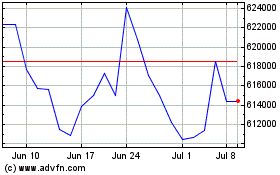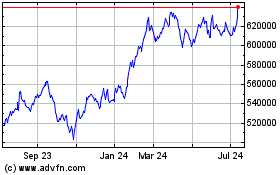By Nicole Friedman
This article is being republished as part of our daily
reproduction of WSJ.com articles that also appeared in the U.S.
print edition of The Wall Street Journal (May 6, 2019).
OMAHA, Neb. -- Berkshire Hathaway Inc. has underperformed the
S&P 500 for a decade, forcing Warren Buffett into a position he
rarely resides: on the defensive.
At the company's widely attended annual meeting Saturday, Mr.
Buffett, Berkshire's 88-year-old chairman and chief executive,
urged investors to keep the faith on a host of issues, including
overall performance, his plans for future stock buybacks and even
transparency.
On performance, he acknowledged that Berkshire has trailed
stocks during a historic bull market but argued it hasn't grown too
big to beat the market in the future.
"It's a question of, can you invest truly large sums reasonably
well?" he said.
He noted that his own will instructs that his Berkshire shares
stay invested in Berkshire after his death until they are
eventually distributed to charity.
"I have a lot of confidence in the ability of the Berkshire
culture to endure and that we have the right people to make sure
that that happens, " he said. "I'm betting my entire net worth on
that."
He also said Berkshire would be willing to spend $100 billion
buying back its own stock in future years if he thought it was
trading at an attractive price. Berkshire bought back $1.7 billion
in stock in the first three months of the year. Over the same span,
the company's cash pile grew to $114.2 billion from $111.9
billion.
Thomas Russo, partner at Gardner Russo & Gardner, a longtime
holder of Berkshire shares, said he hopes Berkshire does more share
buybacks while Mr. Buffett is still in charge.
"They need to buy back a significant amount of it in order to
have free runway to do it when Warren's gone," he said. "Going
forward, it will be an important way to deploy capital."
Berkshire, a $537 billion conglomerate, owns dozens of companies
and invests billions in the stock market. Since Mr. Buffett took
over the company in 1965, its stock produced a compound annual gain
of 21% through the end of 2018, compared with 9.7% for the S&P
500 including dividends. Many early Berkshire shareholders have
become millionaires.
But in the past decade, Berkshire's stock rose by 259% and the
S&P 500 returned a total of 314%. Berkshire shares are up 7.1%
so far this year, while the index has risen nearly 18%.
Berkshire's many businesses continue to churn out cash faster
than Mr. Buffett can spend it.
"It's been disappointing," said James Shanahan, senior
equity-research analyst at Edward Jones. Excluding buybacks, "if
they need to put $100 billion to work, they need a downturn for
that."
Mr. Buffett is best known for swooping in during market slumps
to strike attractive deals. In recent years, however, public
markets have rallied while the value of private companies has also
surged. He has said that prices for good businesses are too high
for his taste.
Some shareholders worry that Berkshire's access to favorable
deals could dry up after Mr. Buffett's death. Companies come to
Berkshire for cash but also for Mr. Buffett's seal of approval,
which can shore up broader shareholder sentiment.
Ajit Jain and Greg Abel, Berkshire vice chairmen and Mr.
Buffett's two potential successors, are well-respected within the
organization but they rarely speak publicly and lack Mr. Buffett's
fame.
This year, Mr. Buffett gave his lieutenants more time in the
spotlight. The two men oversee Berkshire's day-to-day business
operations, and each answered two questions at the annual
meeting.
Mr. Buffett declined an audience member's request to hear from
Todd Combs and Ted Weschler, Berkshire's portfolio managers, who
each oversee $13 billion for Berkshire.
Messrs. Weschler and Combs have invested in technology companies
that are outside Mr. Buffett's traditional area of expertise.
Recently, one of the two invested in Amazon.com Inc., Mr. Buffett
said. Amazon shares are trading near their record high.
Mr. Buffett said Berkshire isn't deviating from its
value-investing approach with its Amazon stake or any others.
One of the managers slightly beat the S&P 500 in the first
quarter, Mr. Buffett said, while the other trailed it. "It's been a
tough period to beat the S&P," he said. "They've made us a lot
of money, but they made it during a market where you'd have made a
lot of money in the S&P as well."
Mr. Buffett also defended Berkshire against criticism that its
reporting isn't sufficiently transparent. Because of Berkshire's
size, it doesn't separate out financial results for many of its
subsidiaries, even companies that would be sizable businesses on
their own.
Mr. Buffett said it's more important for shareholders to
understand how the business runs and its approach to capital
allocation than to see the financial details of each unit's
operations.
Write to Nicole Friedman at nicole.friedman@wsj.com
(END) Dow Jones Newswires
May 06, 2019 02:47 ET (06:47 GMT)
Copyright (c) 2019 Dow Jones & Company, Inc.
Berkshire Hathaway (NYSE:BRK.A)
Historical Stock Chart
From Mar 2024 to Apr 2024

Berkshire Hathaway (NYSE:BRK.A)
Historical Stock Chart
From Apr 2023 to Apr 2024
